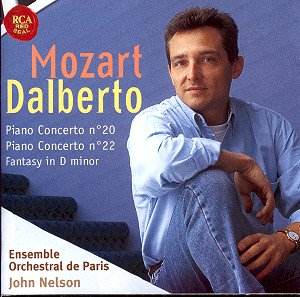Michel Dalberto has made many recordings for
Denon and Erato, and he now has an exclusive contract with BMG.
Unfortunately, his United States exposure is slight as his recordings
either get pulled soon after release or they never get distributed
here at all. Record company logic is that a significant number
of performers will not sell in the States, but how they make their
determinations is a mystery that will never be solved.
Not a mystery is the excellent artistry that
Dalberto has displayed in his many recordings, including his complete
Schubert Piano Sonata series on Denon. John Nelson has also been
highly successful on record. I first made his acquaintance with
the Erato recordings of Berliozís "Béatrice et Bénédict"
in 1991, and he has made many recordings since that time with
a strong preference for Handelís vocal works. Of course, the competition
in Mozartís piano concertos is fierce, and any new release has
to be distinctive and stunning in order to break into the top
ranks. Although both Dalberto and Nelson offer fine performances,
the readings are not superior to most of the alternative recordings
made in recent years.
Before going into specifics about the performances,
Iíd like to offer my perspective of the musical and emotional
progression that Mozart exhibited in his piano concertos as he
matured. Although his concertos through No.19 are exceptionally
crafted and memorable, it is his 20th in D minor where
we start to hear a mature manís music permeated with the regrets
and underside of life as well as its richness. In the D minor,
qualities such as angst, foreboding, grief, and intense determination
rear their heads. These traits begin right at the start of the
work and maintain their hold throughout the 1st Movement.
After a gorgeous first section to the 2nd Movement,
the dark reaches of the mind strike with a vengeance. Even the
often exuberant and playful 3rd Movement has negative
weight flowing through it.
Dalberto and Nelson are excellent in the D minorís
outer movements. They well capture the negative mind-set of each
movement as well as the exuberance and strength. I take issue
with Dalbertoís treatment of the first section of the 2nd
Movement Romance. This section needs to be played in complete
unison with the orchestra and in a highly fluid manner in order
to convey the musicís relaxed state of rapture. Dalberto tends
to shorten note values and often plays either ahead or behind
the beat established by Nelson. The result is some loss of fluidity,
and Dalberto seems anxious to get to the second section to flex
his angst and tension. As it happens, Dalbertoís second section
is exceptional. Both he and Nelson mine the musicís tension and
drama from the beginning with a sense of urgency not usually found
in other interpretations.
All goes very well in the more cheerful E flat
major Concerto. Here, each movement is given its full measure
of exuberance, and the poignancy of the 2nd Movement
Andante is quite appealing. Recorded sound is excellent, although
I would have preferred that Dalbertoís piano be placed more forward
in the soundstage.
For comparisons, I listened to recordings from
Ivan Moravec on Hänssler, Alfred Brendel on Philips, Keith
Jarrett on ECM, Murray Perahia on Sony, and Andras Schiff on Decca.
From my view, Dalberto and Nelson hold up very well to these other
excellent versions except for the first section of the D minorís
2nd Movement. To hear a sublime 2nd Movement,
check out the Jarrett performance where he displays complete unanimity
with the orchestra and makes sure to retain a relaxed and comforting
atmosphere.
Overall, I have no problem recommending the Dalberto
disc that gives us great music idiomatically played except for
the problems I noted above with the 2nd Movement of
the D minor. I do believe that the recording might be superfluous
to the seasoned collector, but all others should get many hours
of enjoyment from this new Mozart offering. My understanding is
that Dalberto will again be precluded from availability in the
United States, but European sales websites can solve that situation
as long as buyers are willing to pay the shipping costs. However,
I donít consider the performances good enough to pay more than
the premium price asked at your local retail store.
Don Satz
